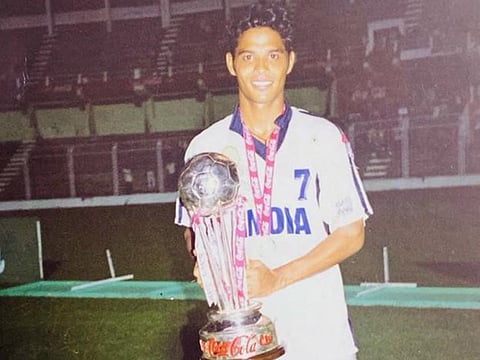Former India midfielder Dias urges strength in depth for future
Jules Alberto Dias cherishes his lone goal that helped the Blue Tigers beat the UAE

Dubai: Former India footballer Jules Alberto Dias has urged authorities to continue stressing the sustained development of a wider pool of players needed to eventually build a strong national team.
Dias — who was the lone goalscorer in India’s shock and only victory over the UAE at a packed Sree Kanteerava Stadium in Bengaluru on April 8, 2001 in a 2002 World Cup qualifier — is convinced the nation’s football team can do much better.
“The current crop of players is very talented and there are a few good youngsters coming through as well. If the quality of football has to improve in India, then we need a wide pool of players to choose from,” Dias told Gulf News from his home in England, where he lives with wife Ruksana and sons Ethan (15) and Nate (9).
“I think that at the moment, there may be about 30 to 45 elite players for the coach to select his national squad from. But, at the same time I think it is only fair that the manager has more of these Indian-origin players to choose from various competitions including the ISL and the I-League.”
Dias is of the firm belief that India needs to adopt tried and tested methods to develop grass roots of football in the country. “If you want to build something, then you’ve always got to start at the bottom. More emphasis needs to be given to the early development of players. But, at the same time you cannot forget the top as that is where you have to reach,” he said.
“The factors and process required to reach the top are many. At the moment, the intentions from all people in authority are there and they are all pushing to improve the standard. But, if we want to improve, then first we have to be the best in our region, then think of being the best in Asia and then look at the world stage. I know this is easy to say, but in reality nothing is impossible.”
Since retiring from football, Dias moved to the UK in 2006 where he has spent much of his time other than the odd and occasional visit to his home in Carmona, in the Indian State of Goa. After starting off as an administrator with a supply chain, Dias currently holds a higher position with the same employer.
Other than his regular job, Dias made time to complete his Uefa ‘B’ Licence in football coaching and Level 1 in Sports Psychology. He is also the official representative of the All India Football Coaches (AIFC) in the UK. “I coach in the evenings regularly after work and I intend to enhance my knowledge even more,” Dias said.
“Unfortunately, sometimes passion itself doesn’t pay enough to clear my bills. Hence, I cannot take a full time interest in football yet.”
It was India’s first competitive match of the 21st century and the Blue Tigers were up against a formidable UAE side, led by 1986 French World Cup coach Henri Michel for their World Cup qualifier.
In the 71st minute, India took the lead when Dias was on hand to poke home past the UAE goalkeeper and send the 40,000-plus home fans into wild celebrations.
“The memory of that goal won’t ever die. It was a special moment for the team, for the country and for me, personally. The goal helped India beat the UAE and the fans went berserk,” Dias said.
“On paper, we had very little chance as we were the underdogs, which is sometimes a good place to be. But we had planned well as a team and our coach Sukhi (Sukhvinder Singh) emphasised that no matter how the game goes, we will still have dead ball situations to deal with, and which we needed to exploit.
“A long throw-in from our right led to confusion in the goal area, and I was first to react to flick it past the UAE goalkeeper.”
After that win, India were held 1-1 at home by Yemen, but did well with two wins against Brunei before travelling to Al Ain for the return leg match against the UAE. “At that stage, it looked like the dream for us had just begun. It kept us thinking that maybe there was something special that could be possible for Indian football,” he said.
“The Indian team was brimming with confidence, and even though we had a draw against Yemen, we were still expecting to do well. But, against the UAE Bhaichung [Bhutia] was shown a red card for very debatable fouls and we lost 1-0. But, we played with 10 men for about 63 minutes, and showed how talented the team was.”
Despite that bright start, India didn’t get to the next stage of qualifiers as they fell one point short at the end of six matches. The UAE advanced from the group with 12 points, while India were tied with Yemen with 11 points each.
“Eventually, it was a great team effort from all, including the coaching staff,” Dias said.
“And it also showed that India is capable of playing at a higher level. There is still a lot of work yet to be done.”
The last time India played the UAE was in their group match of the 2019 AFC Asian Cup where the Blue Tigers lost 2-0 at Zayed Sports Stadium in Abu Dhabi. Khalfan Mubarak and Ali Mabkhout scored on either side of half-time to ensure the hosts topped Group A and leave India at the bottom with three points.
Sign up for the Daily Briefing
Get the latest news and updates straight to your inbox





